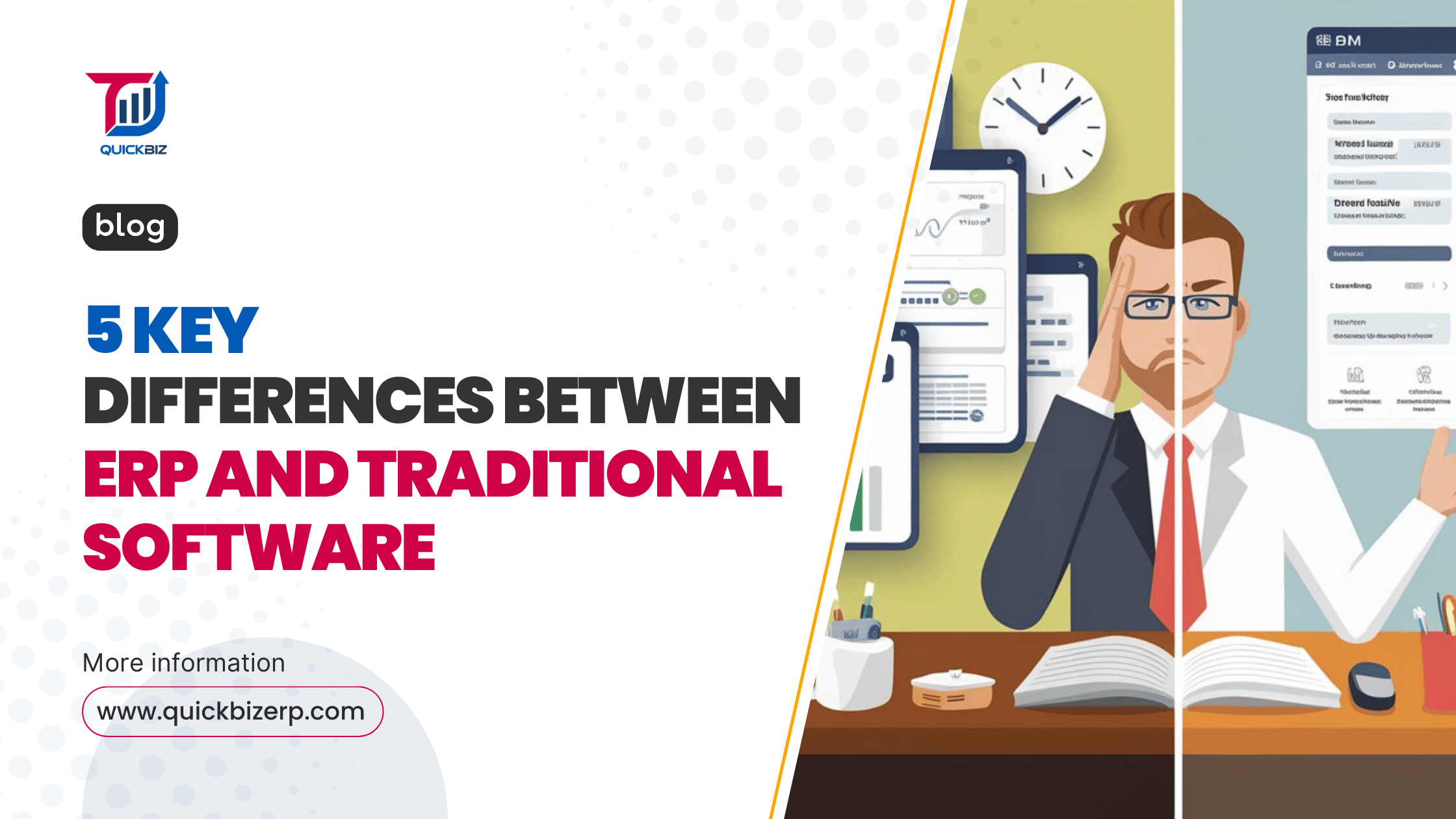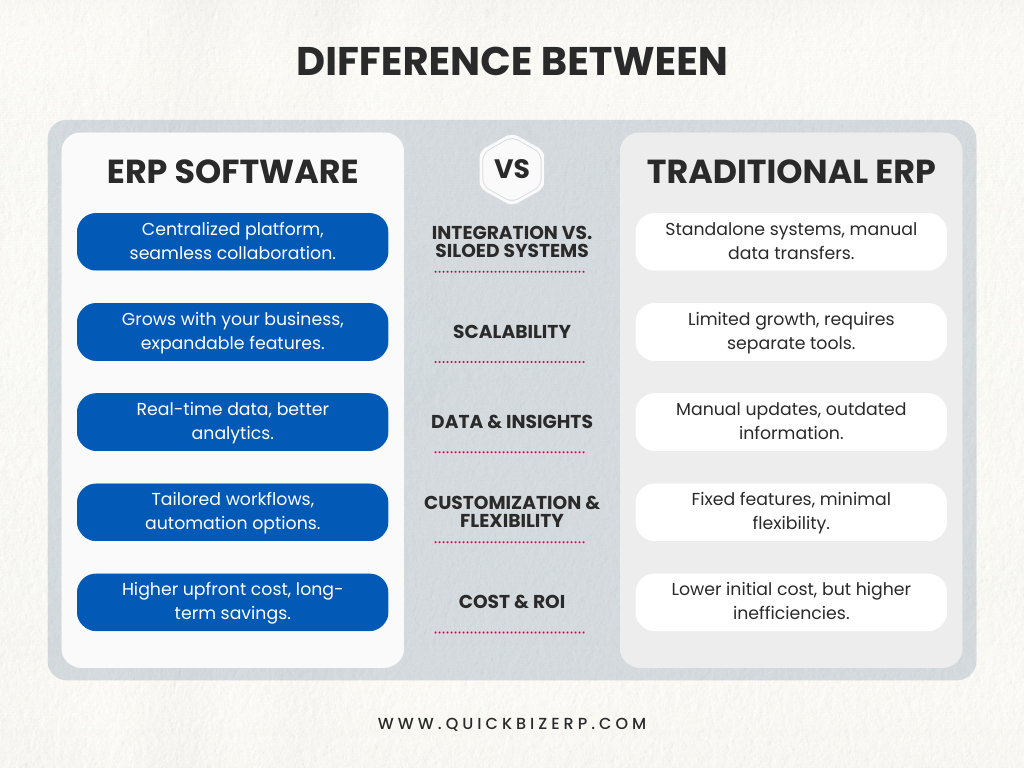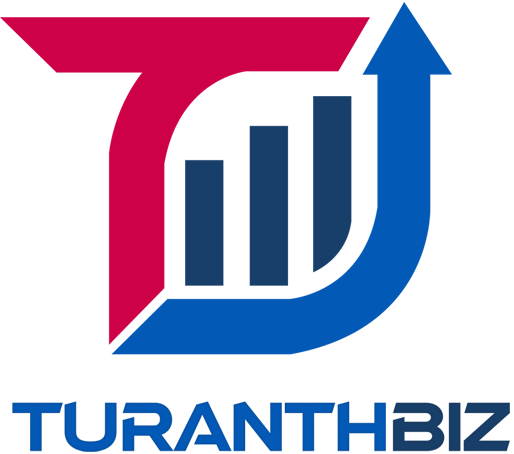5 Key Differences Between ERP and Traditional Software

Introduction
In today’s fast-paced business environment, choosing the right software can make or break operational efficiency. Businesses often find themselves at a crossroads when deciding between Enterprise Resource Planning (ERP) systems and traditional standalone software. While both serve specific purposes, they offer vastly different functionalities and long-term benefits.
ERP software integrates multiple business processes into a single, unified platform, whereas traditional software solutions work independently for specific functions such as accounting, inventory management, or customer relationship management (CRM). The choice between these two depends on various factors like business size, scalability, and cost-effectiveness.
In this article, we’ll explore the five key differences between ERP and traditional software to help you make an informed decision for your business.
What is ERP Software?
ERP (Enterprise Resource Planning) software is a comprehensive system designed to integrate and automate core business processes across an organization. Instead of using multiple software applications, businesses can manage all their operations, such as finance, human resources, inventory, supply chain, and customer relations, from a single platform.
Key Features of ERP Systems:
- Centralized Data Management: Ensures real-time access to accurate data across departments.
- Process Automation: Reduces manual tasks, improving efficiency and accuracy.
- Scalability: Grows with your business by adding new functionalities as needed.
- Cross-Departmental Integration: Enhances collaboration across different teams.
Industries Benefiting from ERP:
- Manufacturing - Manages production planning, inventory, and supply chains.
- Retail - Streamlines inventory, sales, and customer service.
- Healthcare - Enhances patient management and regulatory compliance.
- Finance & Banking - Improves risk assessment and financial reporting. For businesses looking to transition from manual processes to digital solutions, ERP offers clarity over operational chaos and streamlined workflows.
What is Traditional Business Software?
Traditional software, also known as standalone software, is designed to perform specific tasks without integrating with other systems. Businesses often use separate applications for different functions, such as QuickBooks for accounting, Salesforce for CRM, and Excel for inventory management.
Common Examples of Traditional Software:
- Accounting Software: QuickBooks, Tally, FreshBooks
- Customer Relationship Management (CRM): Salesforce, Zoho CRM
- Inventory Management Software: TradeGecko, Fishbowl
- HR & Payroll Software: BambooHR, ADP
While traditional software can effectively manage individual processes, it often lacks interconnectivity, leading to data silos and inefficiencies in workflow automation. For companies looking to scale efficiently, relying on standalone software may limit business growth, as opposed to early-stage ERP adoption, which ensures long-term sustainability.
Key Differences Between ERP and Traditional Software

Which One is Right for Your Business?
When choosing between ERP and traditional software, businesses should consider the following:
Common Examples of Traditional Software:
- Business Size & Complexity: mall businesses with straightforward needs may benefit from traditional software, while growing businesses should consider ERP for scalability and efficiency.
- Operational Efficiency Needs: If your business relies on multiple departments and requires seamless collaboration, an ERP system is the best choice.
- Budget Considerations: While ERP has a higher upfront cost, it provides long-term value by reducing inefficiencies and improving overall performance.
- Industry Requirements: Certain industries, such as manufacturing, retail, and healthcare, require integrated systems to manage complex workflows efficiently.
If your business is struggling with data silos, inefficiencies, and scalability issues, transitioning to an ERP system can be a game-changer.
Conclusion
Choosing the right business software is crucial for long-term success. ERP software offers a unified, scalable, and efficient solution for businesses aiming to integrate operations and improve decision-making. On the other hand, traditional software can work for businesses with simpler needs but often lacks connectivity and scalability.
If your business is growing and requires a streamlined, all-in-one platform, an ERP solution is the right investment. Take the next step and explore how ERP can transform your operations and drive long-term success!

